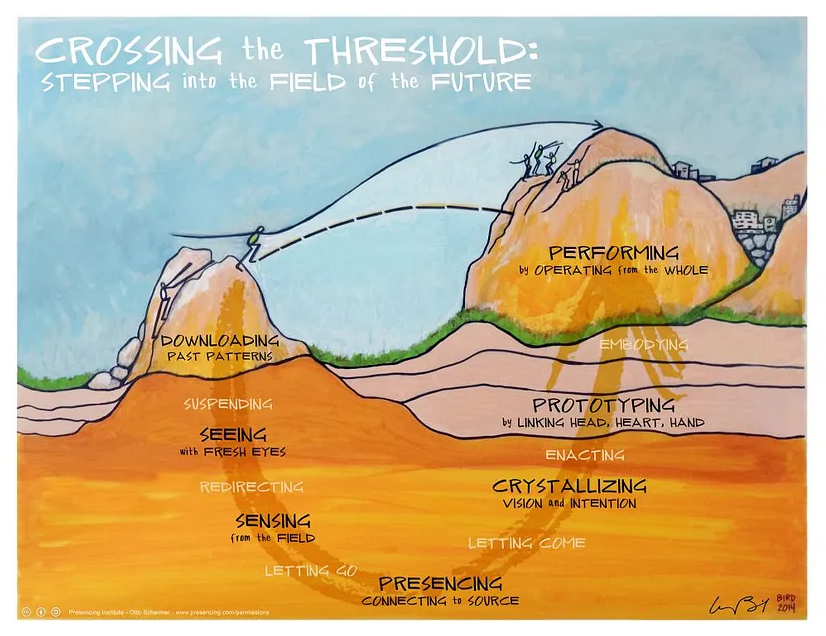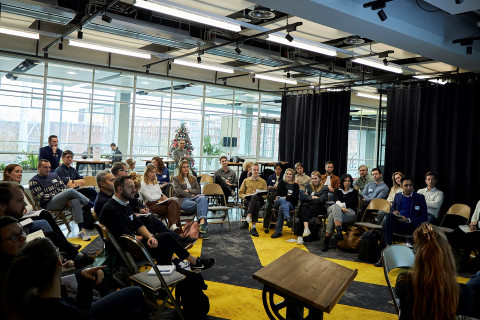We live in a time characterized by significant challenges. We see a world around us facing a climate crisis with global issues such as global warming and loss of biodiversity. A world marked by social inequality and increasing individualization. Change is urgently needed, but it doesn't happen automatically. How can we change the world around us with a holistic view?
To kick-off our final Demoday of 2023, our brand-new partner Hieroo led an inspiring knowledge session about the change method they use for social innovation in the city: Theory U. Dorien Schneider and Maartje Krijnen taught us more about this methodology and how it can help us solve complex problems by shifting from ego to eco-thinking.
What is Theory U?
Theory U is a change management method coined by Otto Scharmer from the Presencing Institute. Scharmer describes Theory U as a “way of being, a framework, a common language and a methodology”. Theory U can help us solve a problem, in a different way than we normally do. In our day-to-day lives, we make limited observations and quickly draw our conclusions – a phenomenon Scharmer terms “Downloading”. We then rush to solutions, because our brains don’t like uncertainty and want to be in control. Theory U is a way to fundamentally change when more of the same doesn’t work. The journey through the “U” consists of 7 stages:
- Downloading past patterns
- Seeing with fresh eyes
- Co-sensing into the field
- Presencing: connecting to the source
- Crystallizing: vision & intention
- Prototyping: linking head, heart and hand
- Performing: by operating from the whole

Why Theory U?
Otto Scharmer describes three divides that require a drastic shift from an “ego-system” to an eco-system that emphasises collective well-being. These divides can be illustrated with three numbers that represent the divides.
- The ecological divide: we’re experiencing an unprecedented loss of nature. The number 1.6 represents this divide: our world economy consumes the resources of 1.5 planets. The ecological divide exists because of a disconnect between self and nature.
- The social divide: we’re experiencing immense polarisation, individualisation and inequity. The number 8 represents this divide: eight billionaires own as much as half of mankind combined. The social divide exists because of a disconnect between self and others.
- The spiritual divide: we’re experiencing an absence of deeper meaning, purpose and value in our lives. The number 2010 represents this divide: in this year, more people died from suicide then from accidents, wars and natural disasters together. The spiritual divide exists because of a disconnect between self and Self – that is, between a current “self” and the emerging future “Self” that represents one’s greatest potential.
In essence, we’re collectively creating results that nobody wants: a loss of nature, a loss of society and a loss of self. Theory U can help overcome these divides by shifting to a mindset where we care about the wellbeing of others instead of just looking out for ourselves.
Theory U in practice
So how does Theory U work in practice? Maartje and Dorien explained how Theory U is applied in projects at Hieroo. One example is the BROODerhood (pun on the word "brood” which means bread in Dutch) project in Bospolder-Tussendijken. This neighbourhood was struggling to control a rat plague. Hieroo used Theory U to come to a solution, together with the residents of the neighbourhood. An important observation (“downloading”) was that there was a lot of bread on the streets in the area. An easy quick fix would be to street signs that would warn against feeding ducks bread, for example. In the “sensing” stage, local residents were interviewed about the issue. It turned out that most people did not want to waste the bread and therefore left it for others, based on their cultural values. The project BROODerhood, aims to celebrate the value of bread through the process of breadmaking. The bread that residents would normally be left on the streets is now used for making the base for sourdough. In this way, Theory U helped the neighbourhood to find the underlying issues, and connect more with each other and with their surroundings.
We ended the Knowledge Session with a typical Theory U approach: an “accompanied writing assignment” with the aim of reflection. In this assignment, Dorien and Maartje asked the participants a set of questions about our work and impact. Think of: “What in your current work gives you most energy?” and “What can we create as a collective in the next 3-5 years? “. This inspiring knowledge session by Hieroo taught us more about how to not immediately jump to conclusions and using a quick fix. We learned how to really take a step back and get to the root of the problem with specific tools to achieve that.
Do you want to learn more about Theory U or get in contact with Hieroo? Leave a comment below and I will bring you in contact with Maartje and Dorien!





